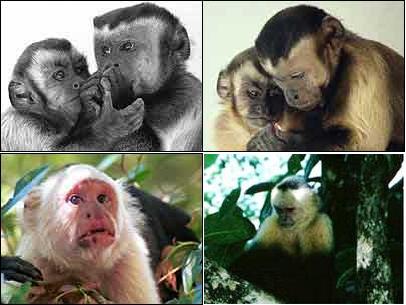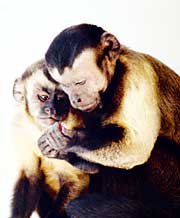Michael Hopkin, Nature (translation: Dikla Oren)

Capuchin monkey. Considered a cooperative monkey
Direct link to this page: https://www.hayadan.org.il/capuvhines.html

Have you ever given your friend a bite of your dessert just to stop pestering you with requests? You're not the only one - chimpanzees and monkeys also share their food to avoid arguments.
The question of why animals give food to others is a tricky one. Previous theories claimed that benevolent animals may be rewarded by similar generosity towards them at a later time.
However, the "avoid unnecessary arguments" approach provides a much simpler explanation, says Jeffrey Stevens, who conducted the study at the University of Minnesota. The Mishnorr and the donor of the food both work for their own interests - the person asking for the food receives food, and the donor is left to his own devices.
Stevens put chimpanzees (Pan troglodytes) or squirrel monkeys (Saimiri boliviensis) in a cage and provided them with a fruit meal. A hungry monkey of the same species was found in a neighboring cage.
The primates almost never passed food through the cage to their hungry friend next door. However, when the partition opened - and allowed the hungry neighbor an opportunity to beg for food, steal it or fight for it - the monkeys began to share their food.
There is a parallel here to a parent who buys his child a toy to silence him, says Stevens. "It's a selfish way to stop the constant rocking," he says.
Curiously, hungry chimpanzees disturbed their neighbor more when the food was cut into small pieces. This fact may reflect the higher chance of the snitch to win alms, if he does not cause a significant depletion of his neighbor's food supply.
This form of "strategic request" may help the narcissists succeed in their actions through modest requests, Stevens speculates. "Think of a child who says: 'Can I have four cookies? Well, then what about one?'" he says. Similarly, most of the alms groups on the streets ask passers-by for nothing more than a small amount of money.
Harassment theory may explain many examples of human "generosity," Stevens says, but he still holds the view that we are capable of giving genuine and sincere charity as well. "There is definitely a parallel here," he says, "but I think that we have the desire to help those whose luck has not improved for them."
Link to the original article in Nature
The human sense of justice - an inheritance from the monkey
Avi Blizovsky
In an experiment conducted in the USA, monkeys were angry about discrimination, after they received a reward equal to less than other monkeys for a task they performed. The experiment strengthens the possibility that the sense of justice is an evolutionary product
19/9/2003
A new study conducted in the USA reveals that monkeys also have a sense of justice, and they tend to protest when they see another transparent person has received more "equal" compensation than them. The results of the study strengthen the possibility that the human sense of justice is a trait passed from the apes during evolutionary development.
The researchers, Sarah Brosnan and Frances de Waal, taught capuchin monkeys, which are considered "collaborators", to exchange tokens for food. The monkeys were very happy to exchange the token for a cucumber, but when they saw that another monkey got grapes - a much more favorite food - in return, they were very offended. In response to this, some of them "sat down" and stopped the rest of the tasks, and others took the cucumber and refused to eat it as a sign of protest.
The BBC reported that the goal of the researchers was to find out whether a person's sense of justice is a behavior that has developed over the generations or the result of a social pattern. During the experiment, conducted at Emory University in the US, pairs of capuchins were given identical tasks, with one of them receiving a cucumber as a reward for each task. The monkey's partner in the experiment sometimes received the same reward, and sometimes - grapes, while several times the monkey received the reward without working at all. "They have never been in a situation like this, where everyone received a different reward," said researcher Brosnan.
As a sign of protest - throw away the prize they received
"The reaction was dramatic," the researchers said. "We received a very decisive response - they simply refused to carry out the task", they added. "The rest of the time, some of them completed the tasks, but did not agree to take the prize. This is very, very unusual behavior," said Brosnan in surprise. The researchers were amazed to see the sharp reactions of the monkeys - some completely ignored the reward, and some took it and threw it to emphasize their anger.
Although the researchers were not surprised that the monkeys showed a certain sense of justice, they were amazed to find that after being offended, the monkeys refused any other reward. The monkeys did not express any emotion towards their experimental partners, nor did they blame them.
Following the publication of the research results, experts said that the possibility that the sense of justice has passed throughout the history of evolution does exist, but they qualify the results and claim that many more studies are needed to reach a definitive conclusion on the matter.
The authors of the study intend to expand their research in the field, and they will conduct similar experiments on chimpanzees, in order to substantiate their conclusions.
Man is not alone: even the monkeys do not want to "go suckers"
By Yuval Dror
Animals / A new experiment suggests that the human sense of justice has an evolutionary explanation

The capuchin cashiers that participated in the experiment. Do not hold grudges. Photo: France de Waal, Emory University
The question of social cooperation has occupied economists, sociologists and anthropologists for a long time. The researchers are trying to understand why humans cooperate with each other - as this sometimes requires a compromise with personal comfort. The willingness to cooperate seems to be closely related to our basic sense of justice.
A new study reveals that the sense of justice is not unique to humans, and that it also exists in monkeys. These showed the researchers that when they find out that they will be unfairly rewarded for the same work that their friends did, they get angry, rebel and "break the dishes".
One of the theories about the willingness to cooperate states that humans understand that cooperation based on a fair distribution of rewards is the best way to obtain those rewards. Experience shows that when people do not receive the just reward in their opinion, they refuse to cooperate. Researchers Dr. Sarah Brosnan and Dr. France de Waal from Emory University in Atlanta, USA, looked for evidence that other animals that cooperate, such as monkeys, do so based on a natural tendency to distribute the rewards justly, and that they also get angry when they are cheated.
The researchers, who published the results of the study in the last issue of the magazine "Nature" used an experiment in a group of female brown capuchin monkeys. This species of monkeys split 4.5 million years ago from the branch of monkeys that evolved over time into humans. The researchers taught the cashiers to hand the researchers pebbles, and in return they were given a reward - food. When the cashiers understood the idea, the researchers divided them into pairs.
The researchers say that in the first phase the experiment was conducted without interruption, with both couples receiving a piece of cucumber every time they performed the task as required. However, after some time, the researchers began to give one of the pairs grapes (a reward considered more desirable than the cucumber) - even though he performed exactly the same task as the other pair. The pair of cashiers who were supposed to receive the cucumber rebelled, and in half of the cases even refused to receive the reward: they preferred to receive nothing rather than receive a reward less than that of their friends.
The rebellion intensified when the researchers gave the first couple grapes, without requiring them to complete the task at all. In 80% of the cases, the finches, who saw how the other pair was given a reward for no reason, expressed their anger by throwing the pebbles out of the cage - and refused to continue the experiment. According to the researchers, they have never seen this behavior of the cashiers: "The behavior was reminiscent of children throwing away a small chocolate bar after the parents refused to purchase a large chocolate cake," said Dr. Brosnan in an interview with the magazine "New Scientist".
According to the researchers, the experiment proved that the monkeys are aware of the distribution of rewards around them, and respond according to an instinctive principle of justice. According to them, the fact that the sense of fairness is expressed in non-human super-mammals may indicate that it developed in humans as a genetic tendency in evolution.
Brosnan said that the capuchin coffers do not hold a grudge, and that after they calmed down, they continued to cooperate with her in other experiments. In addition, they were not angry at the box offices that received a reward that they were not entitled to. According to her, one of the things she discovered was that capuchin males are less sensitive to injustice, perhaps because they are interested in other things: "Males are interested in sex and females are interested in food. This may be the reason why males do not find it appropriate to get angry due to injustice in the distribution of food," she said in an interview on the magazine's website. the basic
Evolution in action
Evolution - the rise of man
For news at the BBC
https://www.hayadan.org.il/BuildaGate4/general2/data_card.php?Cat=~~~638975410~~~51&SiteName=hayadan
